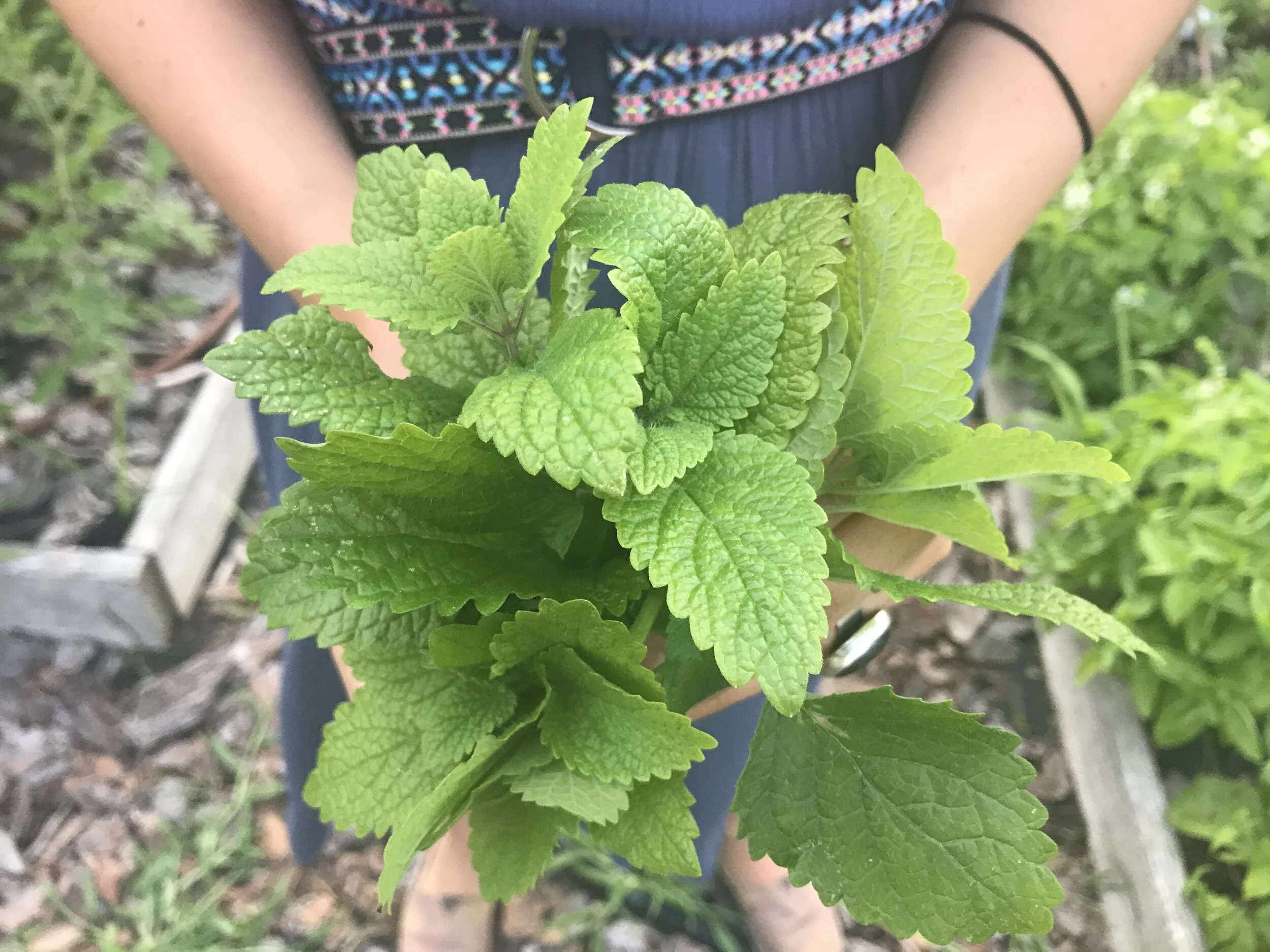Lemon Balm: The “Calm-Down, Chill-Out” Plant & Your IBS Pal
In my last post, I introduced gastro-neuro-immunology, the emerging field that explores the interaction between the gastrointestinal, nervous and immune systems. If you have IBS, this a field you should get interested in. And lemon balm is a plant you should get to know!
One way to learn about gastro-neuro-immunology is to read about it. The science in this field is mind-blowing. It changes how we think about the human body. Another way is to experience it in your own body.
Lemon balm is a great place to start. This plant has a special package of chemicals that works at the intersection of our gastrointestinal and nervous systems. Balm is the key word in lemon balm. Its effect on the gut and nerves is distinctly relaxing, soothing and uplifting. As an added bonus, it tastes and smells heavenly, and it’s easy to grow or to buy.
Let’s explore how lemon balm works:
1. Lemon balm soothes anxiety.
Anxiety comes in many hues, as people who suffer from it (sometimes or frequently) know. For example, there’s the kind makes you feel like an overly tight guitar string—one more turn, and you’ll snap. Or the worried, “what-if?” kind characterized by circular, fearful thoughts about health, life or loved ones. For some people, anxiety toggles back and forth with depression. For others, it manifests physically, as nausea or lack of appetite. The thing about lemon balm is that it helps pretty much any kind of anxiety you can conjure. And, since I can’t imagine a person who’s escaping anxiety right now, it’s a very good time to make friends with this plant. Anxiety is foundational to IBS—even if you don’t think you’re an especially anxious person.
2. Lemon balm soothes the belly.
Lemon balm can relieve painful cramping, spasms, nausea, gas and general GI malaise that plagues every IBS sufferer. It’s unsurprising that a medicine that soothes anxiety also eases GI distress. In our intestines, gut cells hang out very closely to nerve cells and are constantly chatting. Their communication goes both ways. Nerves signal to gut, and gut signals to nerves. In practice, this means that if either system is “off,” the effect can be felt in the other system. It also means that medicine can intervene in either system and help the other.
For example, lemon balm is anti-spasmodic. This means it helps muscles relax. This helps to explain why it is soothing to the gut. When muscles in and around the gut relax, cramping and spasms are relieved. This direct effect is easy to understand. But the anti-spasmodic action has a secondary effect that is less obvious. When the muscles in our belly and across our body relax, they send a signal to our nervous system that everything is ok. It, too, can relax and let go. In this way, less physical tension in the body translates to less emotional tension. We’re used to thinking that our brains are in charge and if we suffer from anxiety, the source of intervention is the brain. But gastro-neuro-immunology (and IBS) breaks down the mind/body divide and helps us see how the body is just as good a place of intervention. Lemon balm, smart plant that it is, talks to both systems and creates a virtuous cycle of relaxation.
3. Lemon balm supports healthy immune function.
While this is not my primary use for lemon balm, it sure is a nice added benefit. Traditionally, lemon balm is used to help the body mount a healthy immune response to colds and fevers. Its essential oils have also been shown to have anti-viral effects against the herpes virus (and no, not against Covid as far as anyone knows).
But here’s the thing: all plants support healthy immune function. So, even if you make a tea to target your anxiety or relieve gas, you can be sure that the phytochemicals in that plant are also playing an anti-inflammatory role, which is the key to good health. You can read lots more about that in my book, Anti-inflammatory Family Cookbook.
4. Lemon balm is great for kids!
If you have children, this is an herb you should have in your pantry. It is absolutely safe, and it’s effective in soothing many little-people complaints. When kids are irritable, cranky, bouncing off the walls, having belly discomfort, or can’t sleep, this is your go-to herb. I call it the “calm down, chill out” plant. And have I mentioned that it tastes good? Lemon balm glycerite is like a tasty treat for kids (try 10 drops in a glass of water). Or try the teas below.
In a nutshell: If you are dealing with any of the following….
Stress - Anxiety - Insomnia - Irritability - Sadness - Hyperactive Kids -
Bloating - Gas - Stomach cramps - Indigestion - and of course…IBS
….try a little lemon balm!
Check out my videos and recipe below ….and share one of yours in the comments section!
Soothing Summer Tea
In this tea, lemon balm combines with mint to make a delicious, refreshing summer beverage.
Serves 6
6 cups boiling water
3 tightly packed tablespoons ripped fresh mint leaves (or 2 mint tea bags)
3 tightly packed tablespoons ripped fresh lemon balm leaves (or 2 lemon balm tea bags)
1 cup tart cherry juice (or juice of your choice)
Ice cubes, if desired
Place mint and lemon balm in a pitcher or mason jar. Pour boiling water over it. Cover with a lid and let steep for approximately 8-10 minutes.
Let cool to room temperature and then chill, either by adding ice cubes or putting in the refrigerator.
Once chilled, stir in juice and serve.
Calm-down, Chill-out Tea
This tea is equally good for soothing belly-aches and relieving anxiety. It also makes an excellent before-bed tea for both kids and adults who have trouble turning down their minds and getting good sleep.
Serves 4
4 cups boiling water
2 tablespoons ripped fresh lemon balm leaves (or 2 tea bags)
2 tablespoons fresh chamomile flowers (or 2 tea bags)
Pour boiling water over the herbs. Steep for 5-8 minutes.
Serve hot or at room temperature, with a spoonful of honey if desired.








